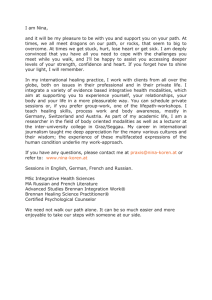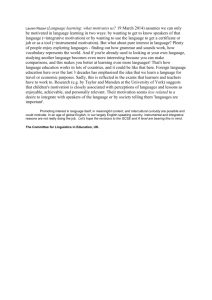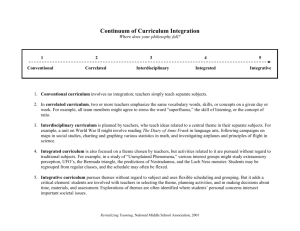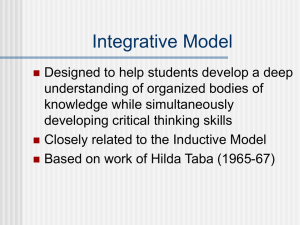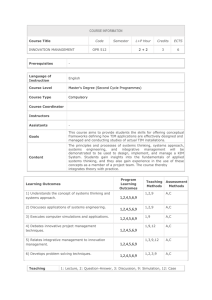Program Faculty - University of Michigan Health System
advertisement
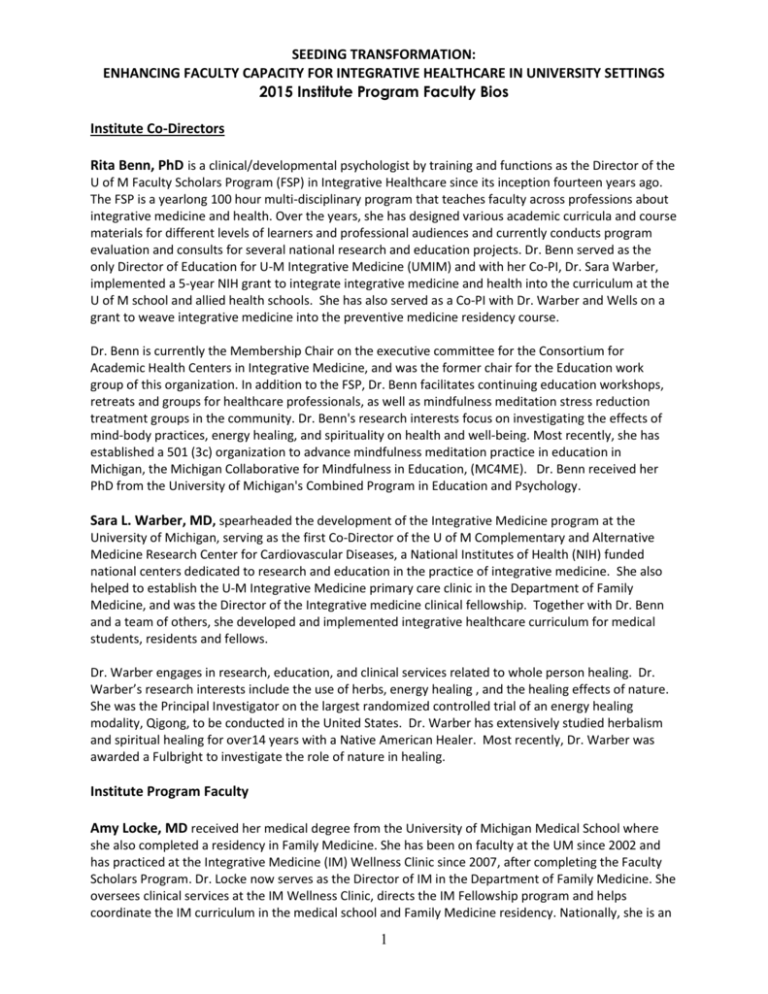
SEEDING TRANSFORMATION: ENHANCING FACULTY CAPACITY FOR INTEGRATIVE HEALTHCARE IN UNIVERSITY SETTINGS 2015 Institute Program Faculty Bios Institute Co-Directors Rita Benn, PhD is a clinical/developmental psychologist by training and functions as the Director of the U of M Faculty Scholars Program (FSP) in Integrative Healthcare since its inception fourteen years ago. The FSP is a yearlong 100 hour multi-disciplinary program that teaches faculty across professions about integrative medicine and health. Over the years, she has designed various academic curricula and course materials for different levels of learners and professional audiences and currently conducts program evaluation and consults for several national research and education projects. Dr. Benn served as the only Director of Education for U-M Integrative Medicine (UMIM) and with her Co-PI, Dr. Sara Warber, implemented a 5-year NIH grant to integrate integrative medicine and health into the curriculum at the U of M school and allied health schools. She has also served as a Co-PI with Dr. Warber and Wells on a grant to weave integrative medicine into the preventive medicine residency course. Dr. Benn is currently the Membership Chair on the executive committee for the Consortium for Academic Health Centers in Integrative Medicine, and was the former chair for the Education work group of this organization. In addition to the FSP, Dr. Benn facilitates continuing education workshops, retreats and groups for healthcare professionals, as well as mindfulness meditation stress reduction treatment groups in the community. Dr. Benn's research interests focus on investigating the effects of mind-body practices, energy healing, and spirituality on health and well-being. Most recently, she has established a 501 (3c) organization to advance mindfulness meditation practice in education in Michigan, the Michigan Collaborative for Mindfulness in Education, (MC4ME). Dr. Benn received her PhD from the University of Michigan's Combined Program in Education and Psychology. Sara L. Warber, MD, spearheaded the development of the Integrative Medicine program at the University of Michigan, serving as the first Co-Director of the U of M Complementary and Alternative Medicine Research Center for Cardiovascular Diseases, a National Institutes of Health (NIH) funded national centers dedicated to research and education in the practice of integrative medicine. She also helped to establish the U-M Integrative Medicine primary care clinic in the Department of Family Medicine, and was the Director of the Integrative medicine clinical fellowship. Together with Dr. Benn and a team of others, she developed and implemented integrative healthcare curriculum for medical students, residents and fellows. Dr. Warber engages in research, education, and clinical services related to whole person healing. Dr. Warber’s research interests include the use of herbs, energy healing , and the healing effects of nature. She was the Principal Investigator on the largest randomized controlled trial of an energy healing modality, Qigong, to be conducted in the United States. Dr. Warber has extensively studied herbalism and spiritual healing for over14 years with a Native American Healer. Most recently, Dr. Warber was awarded a Fulbright to investigate the role of nature in healing. Institute Program Faculty Amy Locke, MD received her medical degree from the University of Michigan Medical School where she also completed a residency in Family Medicine. She has been on faculty at the UM since 2002 and has practiced at the Integrative Medicine (IM) Wellness Clinic since 2007, after completing the Faculty Scholars Program. Dr. Locke now serves as the Director of IM in the Department of Family Medicine. She oversees clinical services at the IM Wellness Clinic, directs the IM Fellowship program and helps coordinate the IM curriculum in the medical school and Family Medicine residency. Nationally, she is an 1 active member of the Consortium of Academic Health Centers for Integrative Medicine where she serves as the Co-Chair of the Clinical Working group. Dr. Locke is active in the Society of Teachers of Family Medicine. She enjoys teaching students and residents, and hopes to increase education around Integrative Medicine topics both locally and nationally. Her experiences are focused on holistic medicine, preventive medicine and nutrition, with a goal of bringing the best of conventional and alternative medicine together to prevent and treat illness. Her clinical interests include nutrition, preventive health and working with children, families and individuals of all ages. In addition to the Integrative Medicine clinic, Dr. Locke works at the Corner Health Center in Ypsilanti. Amy Saunders, MD is an internal medicine and women’s health physician with over 30 years of clinical experience. She served as a Clinical Assistant Professor in the Division of General Internal Medicine at University of Michigan for over 20 years, and has now opened up her own Integrative Health practice, Integrative Health Providers. This practice functions as one of the few multi-disciplinary clinics in the community that has a variety of complementary practitioners working side by side. Dr. Saunders received her MD and completed an Internal Medicine residency at Ohio State University. She did a Fellowship in General Internal Medicine at Duke University Medical Center and obtained a Masters in Public Health at the University of North Carolina. Dr. Saunders participated in the first cohort of the Faculty Scholars Program and has served as cofacilitator of the program in the subsequent years. Dr. Saunders's interest in complementary and alternative medical therapies developed largely experientially, through observing its benefits in her own patients and subsequently seeking alternative therapies for her own care. Dr. Saunders is well-known amongst her patients for her devoted, patient-centered care, where the physician and patient work as a team to find the most beneficial and appropriate treatment course. Eden Wells, MD is a Clinical Associate Professor of Epidemiology in the U of M School of Public Health and the Director for the Preventive Medicine Residency at UMSPH. She is board-certified in both Internal Medicine and Preventive Medicine. She was awarded one of 12 HERSA grants to incorporate integrative medicine into the preventative medicine residency, and recently was elected as a fellow of the American College of Preventive Medicine. Her current activities involve curriculum development, teaching, and applied public health practice training within the preventive medicine program. Dr. Wells teaches many graduate-level public health practice and applied epidemiology courses. From 1992-2002, Dr. Wells served for ten years with the Indian Health Service, USPHS, and prior to the U of M worked for the Bureau of Epidemiology, Michigan Department of Community Health (MDCH), serving as a medical consultant to the Bureau and as a medical epidemiologist. The MDCH activities included investigation of, and response to, public health incidents and outbreaks, and preparedness planning for potential bioterrorism and pandemic influenza events in Michigan. Dr. Wells organized and facilitated the Michigan Pandemic Influenza Coordinating Committee, comprised of Michigan's state agency pandemic planners. She assisted the development of Michigan's State Pandemic Influenza Operational Plan utilized during the 2009 H1N1 influenza pandemic. She also served as a medical consultant to the new MDCH Surveillance for Healthcare -Associated and Resistant Pathogens Unit in the Communicable Diseases Division. Suzanna Zick, ND, MPH pursued a master’s degree in medical anthropology from Michigan State University before moving to Portland, Oregon where she received her naturopathic degree from the National College of Naturopathic Medicine. She returned to Michigan where she received her MPH in epidemiology from the University of Michigan and started practicing naturopathy including herbalism in 2 Ann Arbor in 1997. Dr. Zick, along with Dr. Warber and others, wrote the grant that enabled the establishment of The University of Michigan Complementary and Alternative Medicine Research Center for Cardiovascular Diseases. She was a Co-Investigator on the completed clinical trial examining the effects of hawthorn for individuals with congestive heart failure. Dr. Zick’s current research interests include epidemiological, preclinical and clinical trials investigating botanical medicines and phytochemicals, particularly in relation to cancer prevention and cancer control. Dr. Zick has examined the effect of ginger on chemotherapy-induced nausea and vomiting and had looked at the effect on quality of life and tumor reoccurrence in women breast cancer survivors using an herbal compound called Essiac. She is presently investigating the use of chamomile and acupressure for patients who suffer from cancer fatigue and sleep deprivation. Dr. Zick has been active nationally and served as the Co-chair of the Research Working group for the Consortium of Academic Health Centers as well as on scientific review committees for NIH. She is now President of the professional association, Society for Integrative Oncology. 3

